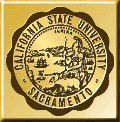|
EDEA 255 Field Experience Seminar Course Syllabus California
State University, Sacramento Spring, 2002 |
||||||||||||||||||||||||||||
|
||||||||||||||||||||||||||||
|
Course Description: Experience and practice in observation and analysis of school environments. This course will explore the many special challenges and salient issues confronting educators in leadership positions at the building, district, and central office levels. Students will research and examine real and perceived challenges facing today’s educational leaders. This class is a prerequisite to EDEA 495, “Field Study in Educational Administration” and may not be taken concurrently. Prerequisites: Admission to the Educational Administration Program; completion of 12 units of coursework including EDEA 201, 205, or 206, and approval of faculty advisor. 3 units. Grading: Credit/No Credit. The
nature of a seminar calls for the active participation of each class
member in the primary research, presentation, and discussion of key
topics relevant to the analysis of school environments.
Small group assignments to increase each student’s capacity to
effect school improvement will be determined during class meetings. |
||||||||||||||||||||||||||||
|
Course Goals: Students
will demonstrate an understanding of the change process as it occurs in
educational settings. Students
will focus on school improvement and skills in observation, analysis,
and feedback. Students
will acquire the knowledge, skills, and abilities to prepare and
implement a field study plan that seeks to resolve a key issue or
problem in a school setting. The
field study is normally implemented during in EDEA 495, though students
have the option of initiating the plan prior to the formal start of the
next semester. Course Objectives: 1. Students will demonstrate an understanding of key approaches to the management of change in educational settings. 2. Students will become familiar with the dynamics of leadership through the examination of models of effective leadership. 3. Students will categorize and analyze data in terms of effective practices in areas including, but not limited to, educational leadership, programs, educational governance and politics, and school community relations. 4. Students will objectively observe and report school conditions, examine underlying assumptions and orientations of those working in schools, and analyze school outcome data. 5. Students will develop a comprehensive plan to study a school and lead the school in improving some aspect of the school or agency/district need. 6. Students will actively participate in class. |
||||||||||||||||||||||||||||
|
The following assignments are due on the dates indicated.
|
||||||||||||||||||||||||||||
|
||||||||||||||||||||||||||||
|
Students will need an electronic mail account and computer access to the Web. All CSUS students enrolled in one or more units can create a SacLink account for electronic mail and Internet services. Although a home computer with a high speed modem running Netscape or Internet Explorer would be beneficial, students can use the Web from one of the campus student labs. Computing Recommendations
|
||||||||||||||||||||||||||||
|
Required Textbooks: · Darling-Hammond, Linda. (1997) The Right to Learn: A Blueprint for Creating Schools that Work. San Francisco: Jossey-Bass Publishers. · Senge, Peter and Nelda Cambron-McCabe, Timothy Lucas, Bryan Smith, Janis Dutton, and Art Kleiner. (2000) Schools That Learn: A Fifth Discipline Fieldbook for Educators, Parents, and Everyone Who Cares About Education. New York: Doubleday Publishing.
Class Handouts: · Special Handout Materials and readings on the Internet You can purchase books through the Hornet Bookstore. Check their Distance and Distributed Learning page at http://www.bookstore.csus.edu/bookstore/distance/ for ordering information. |
||||||||||||||||||||||||||||
|
|
||||||||||||||||||||||||||||
Send problems, comments or suggestions to: elee@csus.edu
California
State University, Sacramento
Educational
Administration and Policy Studies Department
College of Education
Updated: January 3, 2002
